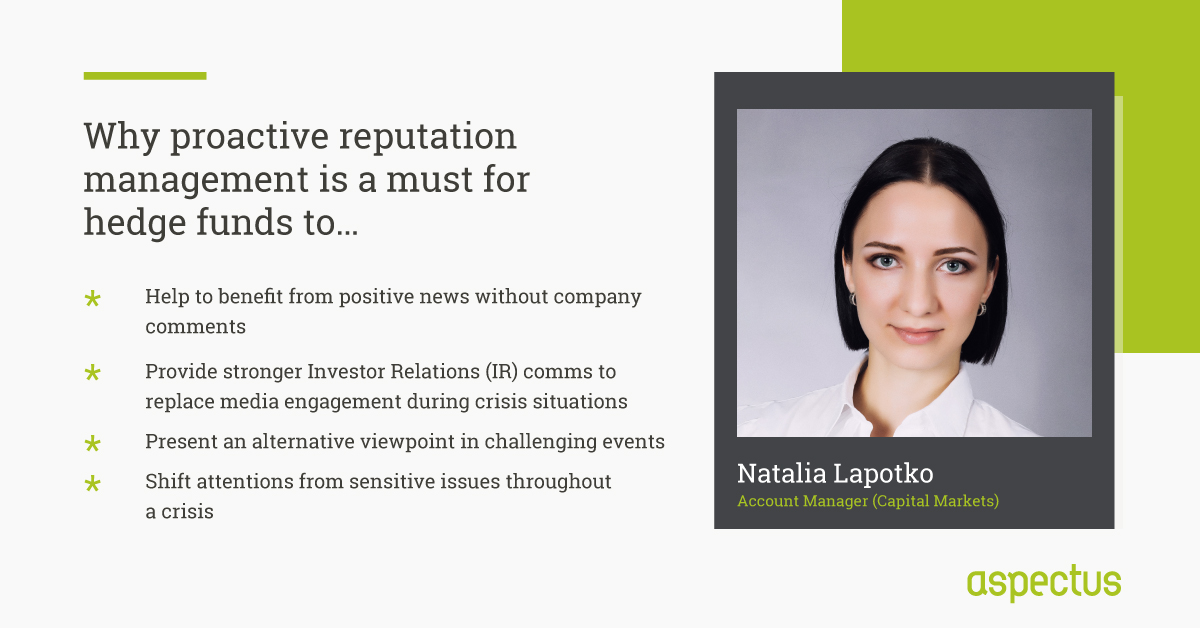Why proactive reputation management is pivotal for hedge funds

By Natalia Lapotko, Account Manager, Aspectus Capital Markets
Economic uncertainty following tragic events in Ukraine puts a spotlight on hedge funds, institutions that are specialising in hedging risks and controlling the intensity of their exposure in financial markets. A crisis like this is a test for major players and a potential death sentence for smaller ones. For the second time since 2020 global markets are undergoing massive changes and like during the COVID crisis, hedge funds find it increasingly difficult to stay “under the radar” as journalists are assessing how various players are facing this challenging time.
According to this FT article market turmoil is splitting hedge funds into macro winners and tech losers. Macro hedge funds enjoy one of their best Q1 results, while technology and growth funds experience double digit losses. Funds with a heavy focus on Russian assets attract a lot of attention from media and vocal supporters of tough sanctions on Russia.
From a communications perspective, this is a good case study showcasing why it is important to secure proactive reputation management ahead of turbulent times.
Helping to benefit from positive news without company comments
In March, BH-DG Systematic Trading fund and Systematica Investments secured positive coverage thanks to their strong performance. FT, for example, explained this success by the fact that these are computer-driven and macro quant funds trading without human sensitivities. These hedge funds educated the audience about their strategies and their benefits in the past and consequently experts used them as examples of a successful quant approach. It is interesting to note that Systematica Investment’s image is powered by its CEO Leda Braga whose nickname is “the queen of quants”. This illustrates that a hedge fund can benefit from the strong public image of its leadership.
Providing stronger Investor Relations (IR) comms to replace media engagement during crisis situations
In April Tiger Global’s 34% slump was widely covered in the media and although the hedge fund declined to comment on this matter, media outlets quoted the firm’s investment team letter to investors:
“In this moment, we are humbled, but steady in our conviction and confident about the go-forward opportunity.”
Although this note hardly changes the situation, it still shows the hedge fund’s willingness to honestly communicate with its investors.
Like many other hedge funds which lost in this situation Melvin Capital, which ended first quarter with 20.6% loss, declined to comment and Bloomberg’s piece on this matter appears to be less favourable without any mentions of IR communications.
Presenting an alternative viewpoint in challenging events
FT story on Firebird Management which pioneered investments in the Soviet Union and is still heavily focused on Russia illustrates that engagement with media can help to present an alternative viewpoint even in situations which appear to be inherently negative.
The article cites Harvey Sawikin, Firebird’s co-founder and lead manager of its eastern Europe and Russian funds, admitting that this risk could have been addressed. While declining to comment on potential losses, he stressed that many investors are interested in buying cheap Russian assets as they are expecting bargains on them. This approach allowed the hedge fund to present itself as a transparent institution which can admit its mistakes but also provides an alternative viewpoint on a very challenging situation.
Shifting attentions from sensitive issues throughout a crisis
During a crisis, like never before, it is useful to have several ongoing projects presenting the company as a forward-looking organisation. During turbulent times, when actual performance may be suffering, this may help to shift the attention from negative agenda. For example, in April HFObserver published the results of its study showing that hedge fund firms hired women for almost half of new ESG jobs. Although media outlets that picked up this news did not cite specific companies, it was a good opportunity for hedge funds to feature on the ESG front.
Conclusion
As the 2020s uncover one crisis after another, hedge funds must be ahead of the curve in their communication strategies. A proactive communication strategy powered by strong IR capabilities can help hedge funds to smoothen negative coverage and own a story when a player benefits from dramatic events.
Undoubtedly the future will bring more crisis situations and it is never too late to start preparing for them. Prep work can not only help to handle a crisis but even to benefit from it.
Related News
-

Getting AI to train your spokespeople
June 27, 2025 -

25 years of TradeTech – the good, the bad and the road ahead
May 19, 2025